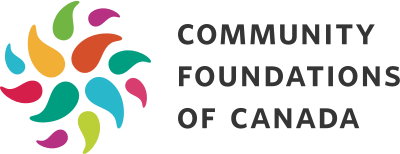Last year, community foundation leaders took time to look forward to what 2021 had in store. As we open 2022, the same community foundations, diverse in size and location, have reflected on their resolutions. These reflections illuminate what incredible work was done last year and the important work that will continue. These reflections look back at the concrete steps community foundations have taken to shift power and strengthen community.

“At the Foundation of Greater Montréal (FGM), we are constantly looking for ways to make our practices fairer, and to listen more actively to our community and its needs. In Canada, there is a relatively small percentage of philanthropic donations directed toward organizations that cater specifically to women and girls, and we set out to help close this gap. Thus was created the Women’s Impact Montréal (WIM) Collective Fund at FGM, spearheaded by the FGM team and a group of female volunteers.
The WIM Collective Fund operates with an open, inclusive structure. Its mission is to address the multiple issues specifically affecting women and girls in Greater Montréal both by raising and distributing funds, and by increasing public awareness. The Fund offers long-term support to vital organizations that are all too often overlooked by grantmakers in an effort to meet the most pressing immediate needs. And through a permanent endowment, the Fund also hopes to continue to seek out sustainable, community-driven solutions to the issues at hand.”
– Kathy Fazel, CFA, ICD.D, Chair of the FGM Board of Directors
“A year ago, I wrote about the efforts to advance equity in our region, and while we are heading in the right direction in some areas, there’s still so much work to do. Change isn’t coming at the speed we want in our society and, in some ways, we might even be moving backwards.
But I’m not feeling defeated. Far from it. I am incredibly inspired and energized by the meaningful work happening on the ground by community organizations here in Greater Victoria, as well as the opportunities for learning and growth that have led to connections, ideas, and new approaches for greater impact. Being part of the CFC FGE cohort nationally, for instance, has offered peer learning and leadership to help us gain greater traction within our own organization as we look to deepen our impact toward gender equity.
To that end, we’ve been continuing to evolve our granting to centre equity and relationships through a trust-based philanthropy approach. We’ve also been shifting more of our investment portfolio for impact, as well as taking a deeper look at our own internal practices and policies.
The commitment on display here and the important conversations happening give me great hope.
These have been difficult times for so many and this is not easy work. But we’re going to keep moving forward together.”
– Carol Hall, Victoria Foundation

“I think it all starts with looking in the mirror. Who are we and what do we bring of ourselves to our role in philanthropy? Are we part of the problem or part of the solution? If our philanthropic systems do not embrace gender equality then achieving it through our granting is simply not possible. So we started with what sounded like a simple proposition: Recruit a group of women donors and co-create a program to learn together and jointly invest in organizations supporting women and girls in the city. This became the Trust Collective, a powerful network of women philanthropists and community leaders working together.
Fast forward almost three years and the program looks significantly different from how we had initially designed it. Of course! We didn’t have all the answers then and we certainly don’t now. But our organization will be forever changed by this experience. The leadership and ownership shown by the members of the Trust has taught us that sometimes our job is simply to create a welcoming and inclusive space and then to get out of the way. Gender equality will only be realized when women, particularly those with lived experience, are fully able to design their own paths.”
– Sharon Avery, Toronto Foundation
“The communities in our region are some of the most diverse and inclusive you can find yet there is still work to be done in the area of gender equality. Wood Buffalo Community Foundation (WBCF) took part in the Gender Equality Fund in 2021. The three pillars of this program are: Granting; Policies; and Investments.
The outcomes of funding for the local programs have been an increased feeling of belonging for youth; increased positive mental health; and an increase in self-confidence and body positivity. These programs have empowered girls and gender diverse individuals.
As an organization, WBCF also has work to do. We are a young organization and have the opportunity to implement policies that incorporate a gender lens. This has meant thoughtful conversations with our committees and Board. These conversations will continue so as to ensure equality stays at the forefront of what we do.
WBCF identified the percentages of gender lens investments (GLI) and we will continue to have discussions and create actions to increase our GLI as we grow. Funding programming, education, and investment opportunities that empower gender diverse individuals is an important step towards a more understanding and inclusive society. We hope that continuing through this work our communities will become stronger.”
– Gaylene Weidlich, Wood Buffalo Community Foundation

“Edmonton Community Foundation (ECF) recognizes that our city is a region with tremendous assets, full of creativity, vibrancy, and resiliency. However, we also acknowledge that some of these potentials are not fully realized because of inequities.
One of our resolutions for 2021 was to continue to be strategic and responsive to the changing needs of the many people and socio-cultural communities served by the Foundation.
In 2021, ECF conducted the Edmonton Vital Signs project, themed Making Ends Meet. This project was done in partnership with the Edmonton Social Planning Council. Vital Signs is an annual checkup that measures how the community is doing. This publication reviews community issues that are timely. At ECF, we use the Vital Signs publications as a vehicle to create awareness. It also helps distribute key community indicators to stakeholders and policymakers.
One of the topics reviewed was The effects of Intersectionality on Making Ends Meet in Edmonton. It was a great learning opportunity for ECF and advisory committee members who worked on the project. It was also a great tool to educate the community on the need for an intersectional lens and its importance to social equity work.
The research showed that social issues such as the income gap persist. In addition, racialized communities and immigrants experience greater unemployment and underemployment collectively, but immigrant women are hit the hardest. One of the learnings from this research is the urgent need to include an intersectional approach to advance gender equality, to avoid a scenario where the advancement of one minority group hurts another and to prevent situations where events and movements that aim to address injustice towards a group may end up propagating or prolonging systems of inequities towards another group.
The interest sparked by this report led to a Well-Endowed Podcast episode on this topic and several presentations across the community.
Edmonton Community Foundation’s Equity Resolution for 2022: Our learnings from the previous year will guide our steps in 2022.
ECF will continue to support and amplify community voices to educate and transcend barriers to enable equity-seeking communities in Edmonton to reach their full potential and thrive.”
– Nneka Otogbolu, Edmonton Community Foundation




